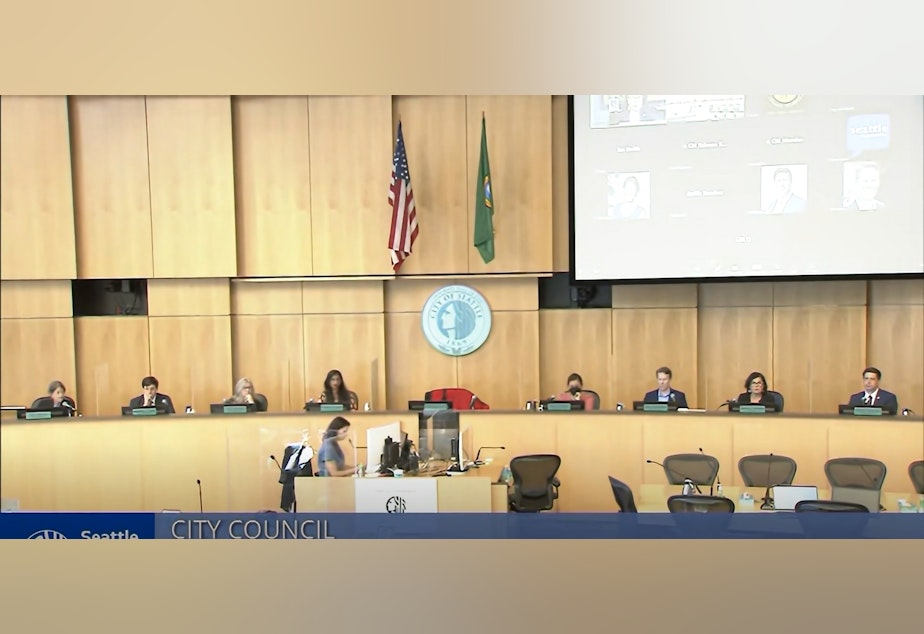Finger-pointing and fallout in the wake of Seattle City Council drug law vote

This week, after lengthy public testimony, the Seattle City Council voted down a proposal to adopt the state law in city code, which would have allowed City Attorney Ann Davison to prosecute drug possession cases. In the wake of that vote, the council has come under fire from Seattle Mayor Bruce Harrell. Meanwhile, law enforcement groups and prosecutors say the start date for the new state law might be later than expected.
Mayor Harrell said Thursday that the law was thoughtfully crafted and he faulted the City Council’s process that resulted in the measure going down.
“So, codification of state law into city law should really just be a perfunctory matter,” he said. “And the council, the opportunity they missed, was to define as a legislative body, what a compassionate approach with that legislation should look like."
"Instead, what happened is that they were listening to public testimony and not going through a committee process, and trying to make decisions as they did on a real-time basis.”
Council President Debora Juarez said she brought the proposal before the full council at the request of Councilmember Lisa Herbold, skipping a hearing before the Public Safety & Human Services Committee.
Harrell added, “It was my understanding before the council deliberated, we assumed it was going to pass as most legislation does when it’s a codification of state law. So we had no reason to believe it wasn’t going to pass. And the work we started even before they deliberated, on what a post-Blake city would look like, we’ve already begun and we’ll have that hopefully wrapped up sometime in July.”
Sponsored
He said that work will spell out how to provide better access to addiction treatment and “where we can take people who are in need.” Harrell said in the next couple weeks he’ll meet with the King County Prosecutor’s Office, the city attorney, judges and “advocates on both sides” to craft a new legislative proposal in the wake of the council's vote.
Law enforcement question when state drug law goes into effect
City attorneys and municipal courts have been urgently preparing for the July 1, 2023, effective date of the state’s new drug possession law, SB 5536, which makes the offense a gross misdemeanor. But law enforcement officials and prosecutors say they may have more time to prepare: a key provision of the existing stopgap law remains in effect until Aug. 15, which may preclude enforcement until then.
The state's current law (SB 5476) was passed as a temporary fix in 2021 after the Washington Supreme Court threw out the state’s felony drug law in the Blake decision. Legislators at that point made drug possession a simple misdemeanor. That measure requires police officers to document at least two referrals to treatment and services before arresting someone for drug possession. Many law enforcement officials say they have no mechanism to track those referrals, and have made very few arrests under the current law.
That requirement “basically made that statute unenforceable,” Thurston County Prosecutor Jon Tunheim said. And he said that the requirement to refer people twice to treatment services remains in place under the new Washington law until Aug. 15 of this year, even as other portions of the new law take effect on an emergency basis July 1.
Sponsored
“So my understanding is law enforcement is looking at this, prosecutors are looking at it, we’re looking at it. But if you read it technically the way it is, we may not be able to do much enforcement until August when that ‘two prior diversion’ requirement goes away,” Tunheim said. He credited the Washington Association of Sheriffs and Police Chiefs with flagging the issue.
The Association sent the following message about the new drug possession law to its members at the close of the special session:
The bill contains an emergency clause for certain provisions. As we read and understand the effective dates, the provisions establishing simple possession/public use as a gross misdemeanor take effect July 1, 2023. However, please be advised that the section that repeals RCW 10.31.115 (the law that prohibits arrest for simple possession unless the individual has been referred to services in lieu of arrest on at least two prior occasions) does not take effect until 90 days after adjournment of today’s special session. WASPC estimates this to be August 14, 2023. In other words, you are still prohibited from arresting for simple possession on July 1 unless two referrals have been given, but as always, check with your legal advisor.
KUOW's John Ryan contributed to this report.




